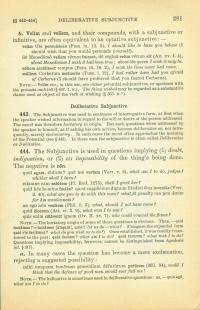443. The subjunctive was used in sentences of interrogative form, at first when the speaker wished information in regard to the will or desire of the person addressed. The mood was therefore hortatory in origin. But such questions when addressed by the speaker to himself, as if asking his own advice, become deliberative or, not infrequently, merely exclamatory. In such cases the mood often approaches the meaning of the Potential (see § 445). In these uses the subjunctive is often called Deliberative or Dubitative.
444. The subjunctive is used in questions implying (1) doubt, indignation, or (2) an impossibility of the thing's being done. The negative is nōn.
Quid agam, iūdicēs? Quō mē vertam? (Verr. 5.2)
What am I to do, judges? Whither shall I turn?
Etiamne eam salūtem? (Pl. Rud. 1275)
Shall I greet her?
Quid hōc homine faciās? Quod supplicium dīgnum libīdinī êius inveniās? (Verr. 2.40)
What are you to do with this man? What fit penalty can you devise for his wantonness?
An ego nōn venīrem?(Phil. 2.3)
What, should I not have come?
Quid dīcerem? (Att. 6.3.9)
What was I to say?
Cēlāverit īgnem? (Ov. H. 15.7)
Who could conceal the flame?
Note— The hortatory origin of some of these questions is obvious. Thus, Quid faciāmus? = Faciāmus [aliquid], quid? Let us do what? (Compare the expanded form Quid vīs faciāmus? What do you wish us to do?) Once established, it was readily transferred to the past.
Quid faciam?
What AM I to do?
Quid facerem?
What WAS I to do?
Questions implying impossibility, however, cannot be distinguished from apodosis (cf. § 517).
a. In many cases the question has become a mere exclamation, rejecting a suggested possibility.
Mihi umquam bonōrum praesidium dēfutūrum putārem! (Mil. 94)
Could I think that the defence of good men would ever fail me!
Note— The Indicative is sometimes used in deliberative questions.
Quid agō?
What am I to do?

